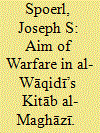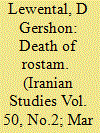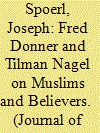| Srl | Item |
| 1 |
ID:
174416


|
|
|
|
|
| Summary/Abstract |
The Kitāb al-Maghāzī or “Book of the Raids” by the early Islamic historian Muḥammad b. ‘Umar al-Wāqidī (ca. 747–823) appeared for the first time in English translation in 2011. The editor and lead translator, Rizwi Faizer, asserts in her introduction (coauthored with Andrew Rippin) that “ … the primary theme that runs through al-Wāqidī’s Maghāzī is that Muḥammad’s battles were always defensive.” The present article shows that this is a misinterpretation of the text. According to the evidence supplied by al-Wāqidī, it is clear that Muḥammad’s military efforts were motivated by far more than mere self-defense. Warfare as Muḥammad practiced and preached it was missionary warfare. Its purpose was to stamp out polytheism, and, more broadly, to destroy a non-Islamic social and political order and to replace it with an Islamic one. The goal of this new order was, in turn, to induce conversion to Islam.
|
|
|
|
|
|
|
|
|
|
|
|
|
|
|
|
| 2 |
ID:
151802


|
|
|
|
|
| Summary/Abstract |
The death of the Persian dynast Rostam b. Farrokh-Hormozd at the Battle of al-Qādisiyyah during the Arab-Islamic conquest of Iran received much attention in both the Islamic conquest literature and the Persian epic tradition canonized in the Shāh-nāmeh. A careful examination of the narratives of early Islamic history teaches us much about the mindset of those living in the first centuries following the momentous events of the seventh century. By removing the layers of literary embellishment and moralistic exegesis, we can understand better the impact of the death of this Sāsānian dynast. In addition, by comparing the narrative traditions, we can uncover valuable testimony regarding the early development of what might later be described as an Islamic Iranian identity.
|
|
|
|
|
|
|
|
|
|
|
|
|
|
|
|
| 3 |
ID:
177658


|
|
|
|
|
| Summary/Abstract |
Fred Donner contends that Muḥammad (c. 570–632) led an ecumenical movement of “believers,” a term used frequently in the Qur’ān which Donner defines as a generic term that included Jews and Christians as well as former polytheists who followed Muḥammad’s newly-proclaimed koranic prescriptions. In Donner’s view, only several generations after Muḥammad’s death did this movement come to call itself “Islam” and its members “Muslims” in the sense of a confessional identity over and against Judaism and Christianity. Tilman Nagel argues, to the contrary, that Muḥammad’s movement was neither ecumenical nor inclusive and that it had a distinct confessional identity from the outset with which it self-consciously set itself apart from Judaism and Christianity. For Nagel, “believers” are a subset of Muslims, which was distinguished by their willingness to wage religious war under Muḥammad’s command against polytheists, Jews, and Christians. Nagel’s understanding of the Muslim/believer distinction better accords with the relevant koranic verses than does Donner’s. It also accords far better with the earliest biographies of Muḥammad. Moreover, Nagel’s thesis accounts for all of the data that Donner’s thesis seeks to explain without raising the further problems that plague Donner’s revisionism.
|
|
|
|
|
|
|
|
|
|
|
|
|
|
|
|